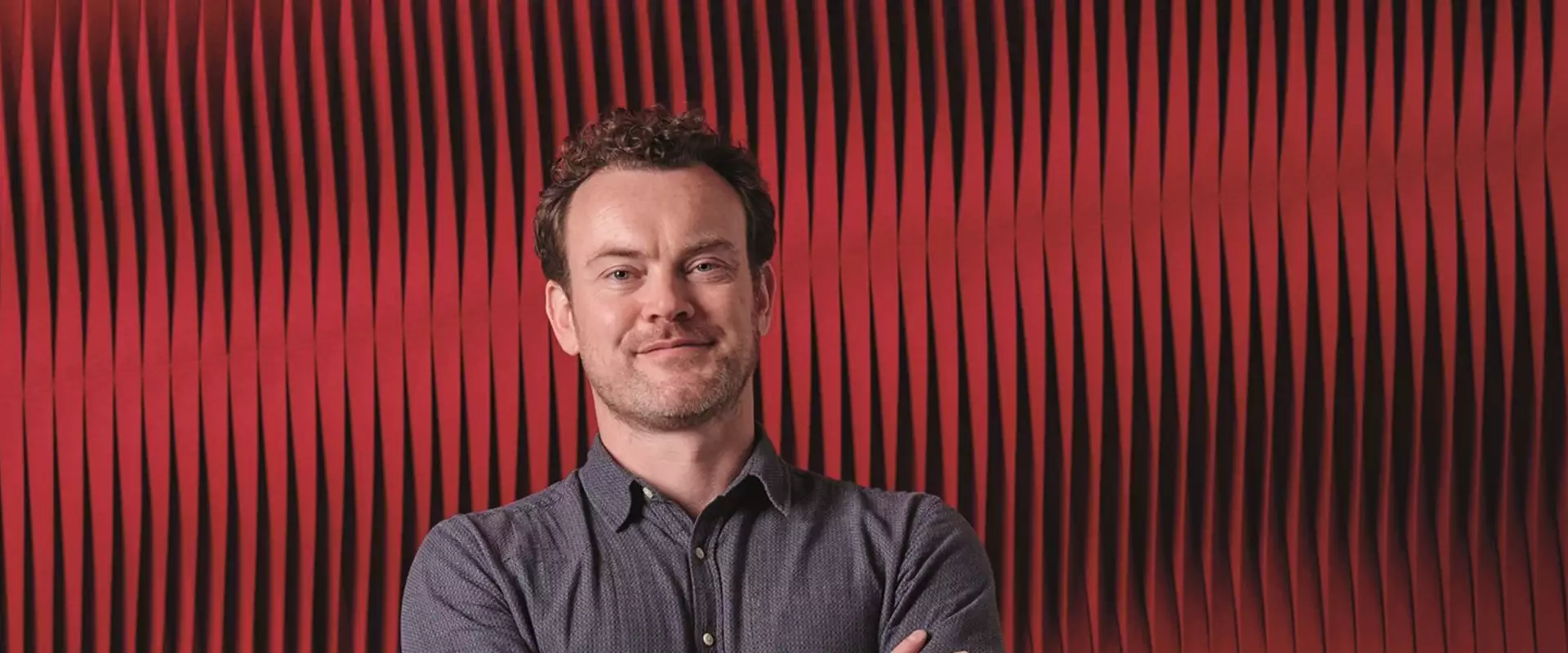One in two founders have at least one form of mental health illness, but entrepreneurs often hesitate to speak out about their struggles for fear of looking weak. Thankfully, the tide seems to be turning.
Back in 2003, entrepreneur David Plans awoke to a nurse telling him that he was lucky to be alive. He had suffered a cardiac arrest due to burnout, and starvation caused by excessive stress. “I collapsed, flat-lined,” he explains. “My body had been speaking to me, but I hadn’t been listening.”
David took a career leap. He launched healthcare start-up BioBeats, an app that helps professionals take control of their mental wellbeing, out of Cargo Works near Waterloo. But then he found himself in the same situation yet again. He was in San Francisco pitching to a tough crowd of investors when the chest pains started. This time, he headed straight for a hospital.
David Plans, CEO of BioBeats at Workspace Cargo Works
“The doctor took one look at me and said it was serious,” says David. “He handed me a bottle of nitroglycerin to spray under my tongue if I felt any worse while I waited”. Nitroglycerin is an explosive used to blow up bridges in WW2; in small doses it’s effective in relaxing the blood vessels.
“I said to him, ‘Okay, but how much longer is it going to take, because I’ve got to pitch in an hour?’” says David. “As the words were coming out of my mouth, I stopped for a moment and realised that something was terribly wrong.”
As an entrepreneur it's like being in a really fast car. You can't think, you're just driving.
David Plans, CEO of BioBeats, at Cargo Works near Waterloo
David had come uncomfortably close to what the Japanese call “karoshi” (literally “overwork death”), and he was lucky enough to recognise that he was neglecting his mental wellbeing, before it was too late.
The ‘sink or swim’ mentality
Mental illness is all too common in the business world. Founders often don’t want to admit to mental health problems in case investors view it as a sign of weakness.
A study by Michael Freeman, a psychologist and psychiatrist at the University of California, found that half of entrepreneurs have had at least one form of mental health illness in their life, including depression, ADHD, bipolar disorder and addiction, and around a third have struggled with two or more. It’s a growing epidemic.
But why are so many entrepreneurs suffering? Dr Shaun Davis, co-author of Positive Mental Health: Overcoming Mental Health Problems, explains that starting a business can be incredibly isolating. Entrepreneurs can prioritise their business over social activities, and easily become detached from friends and family.
For anyone who's depressed, I really recommend doing something for other people.
Andrew Hunt, Co-Founder and CEO of Aduna, at Kennington Park in Oval.
“Imagine you’ve just invested £10k of your own money into a new venture,” says Shaun, “You’re going to put yourself under an enormous amount of pressure every second of every day to make it work, and you might expect a return on it too soon.” These can be unrealistic ambitions. “Keep perspective and allow other people to help you with this,” he advises.
Inside the mind of an entrepreneur “is an embodied feeling of utter urgency”, says David. “It’s like being in a really fast-moving car. You can’t think, you’re just driving. All you want to do is get to the next pitch, close the money, make a payroll and make sure it doesn’t die.”
But the hard truth is that only a tenth of all start-ups triumph, according to research from Startup Genome. Disappointment is a very real outcome. However, founders often feel unable to vocalise business worries to their team, investors or clients. A compulsion to keep morale high and stakeholders happy can aggravate feelings of anxiety, depression and loneliness.
“That’s what we’re taught as children: don’t complain, don’t moan and always work hard,” says David. “Investors bet on racehorses. They pick them, look at their teeth and see if they know how to race. Once you’re running, no one wants to hear whether you’re having a good time, they just want you to race.”
Entrepreneurs are often deluded as to what their chances are, so they “distort reality to shape it around success”, says David. “That means that they don’t feel disillusioned the same way other people do because they just have to ignore it. There’s no room or time for that feeling.”
Yet, while it can be hard to set boundaries between work and down time, it’s important to set the body up to support the mind, says Shaun. “Business owners should think about working reasonable hours, getting adequate hydration, rest, diet and exercise, and strengthening a healthy perspective.” This will set them up to “win the race”.
Andrew Hunt, CEO of Aduna at Workspace Kennington Park
Develop a sense of purpose
Entrepreneurs who have a strong sense of purpose are more likely to thrive. Business founder Andrew Hunt used to work in an unrewarding, albeit well-paid, job in advertising, and suffered an “existential crisis” as a result. Questioning his purpose in life, he quit his job and was suicidally depressed for around six months.
He tried it all: yoga, acupuncture, psychotherapy and antidepressants, but nothing seemed to shift his negative mindset until he received a random phone call from a farmer friend in The Gambia, West Africa. The friend needed help on a project working with small-scale producers of the baobab fruit.
“I rocked up in The Gambia – known as the smiling coast of Africa – clinically depressed,” says Andrew. “I was at this heart of vibrancy, vitality and positivity and it brought me back to life within two weeks. I felt like I wanted to share that with the rest of the world.”
It was the challenge of creating a business to help those in need that gave Andrew a new perspective on the world and a sense of purpose. Now, his superfood business Aduna is flourishing out of Kennington Park business centre in Oval.
“For anyone who’s depressed, I really recommend doing something for other people,” says Andrew. “It’s difficult to control what’s going on in the mind, but a positive step can be to help others and, in turn, that could help you.”
Put your health first, stay connected to others, and pinpoint a business mission that resonates with your values and what you want to achieve in life.
For mental health support in an app, try downloading Moodpath. This personalised mental health companion offers a place to reflect and receive information, encouragement and guidance. It also learns from your responses and checks in on you.
You can also read advice on how to Welcome Wellness into the Workplace with insights from Shine Workplace Wellbeing, based at China Works in Vauxhall. Or, learn how to boost your mood with these expert tips on getting the best sleep.
The last few months have been a challenging and stressful time for many entrepreneurs. If you're looking for support on how to navigate your business through COVID-19 and beyond, head to our Back to Business Hub. Here, you'll find helpful advice and up-to-date resources to help your business stay on track.



